School Journal Level 4 May 2021
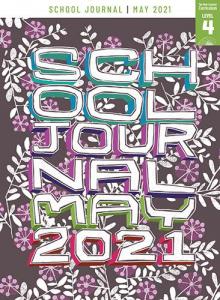
PDFs of all the texts in this issue of the School Journal are available online as well as teacher support materials (TSM) for the following:
| TSM | ||
| Memoir | Break-up Day | ✔ |
| Comic | Press B | ✔ |
| Articles | Reducing Our Footprint | ✔ |
| Kei te Tāone Nui: Māori and the City (1945–1970) | ✔ | |
| Poem | Save the Earth Song | ✔ |
| Stories | Fleet of Foot | ✔ |
| Please Don’t Tap the Glass | ✔ |
Look inside this issue
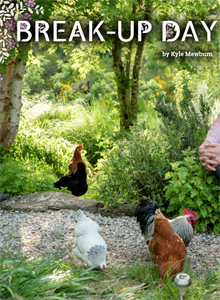
Break-up Day
by Kyle Mewburn
Kyle Mewburn shares her experience of growing up as a transgender girl and explores gender in a way that shows how, despite the challenges and expectations of others, she managed to find a sense of identity and belonging.
Series: School Journal Level 4 May 2021
Learning area: English, Health and Physical Education
Curriculum level: 4
Reading year level: 8
Category: Non-fiction
Related titles: See TSM
Topics: author, belonging, bravery, break-up, childhood, courage, embarrassment, friendship, gender, identity, inclusive, individuality, inspiration, intermediate, LGBTQIA+, pretending, puberty, rainbow, relationship, relationships and sexuality education, RSE, school, self, sexuality, transgender, wellbeing, writer, writing
In: School Journal Level 4 May 2021
Publication date: May 2021
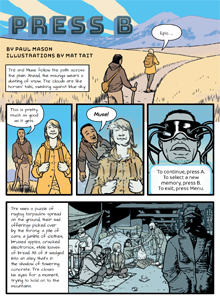
Press B
by Paul Mason; illustrations by Mat Tait
Paul Mason continues his story of a dystopian future, told from the perspective of Tre and Muse, both of whom have spent their young adult lives fighting back against the rulers. This latest instalment in the series is told using a comic format.
Information and tips for using comics in the classroom:
Series: School Journal Level 4 May 2021
Learning area: English
Curriculum level: 4
Reading year level: 8
Category: Fiction
Related titles: See TSM
Topics: comic, courage, democracy, dystopian, fascism, friendship, future, government, Muse, power, rebellion, resistance, revolution, science fiction, sequel, social action, Tre, virtual reality
In: School Journal Level 4 May 2021
Publication date: May 2021
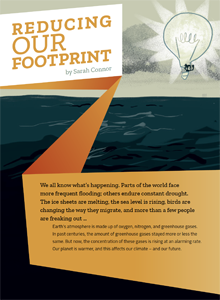
Reducing our Footprint
by Sarah Connor
This is the final article in a series that explores climate change. The first explains what it is; the second explores the difficulties in making predictions about it; and this, the third, looks at the ways people have responded to the challenge of climate change. It profiles four different organisations or people: an e-bike company, food recyclers, a scientist who’s developed an app for the agricultural sector, and a hemp farmer.
Series: School Journal Level 4 May 2021
Learning area: English, Science
Curriculum level: 4
Reading year level: 7
Category: Non-fiction
Related titles: See TSM
Topics: agriculture, carbon dioxide, carbon emissions, carbon footprint, change, citizenship, climate action, climate change, e-bikes, electric bikes, energy, entrepreneurs, environment, farming, food rescue, fossil fuels, future, greenhouse gases, hemp, innovation, making a difference, nitrogen, petrol, pollution, power, recycling, solar power, technology, zero waste
In: School Journal Level 4 May 2021
Publication date: May 2021
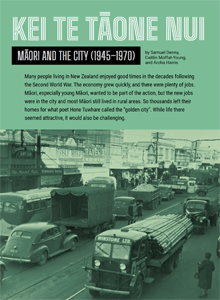
Kei te Tāone Nui: Māori and the City (1945–1970)
by Samuel Denny, Caitlin Moffat-Young, and Aroha Harris
The post-Second-World-War era in Aotearoa New Zealand saw one of the fastest rates of urban migration in the world, with Māori migrating to cities in large numbers to take advantage of new economic opportunities. The “golden city” offered much, but it came at a high price. Despite an unquestioned narrative in Pākehā communities that New Zealand’s race relations were world leading, Māori moving to the city encountered prejudice and discrimination at many levels. Māori responded to these challenges in multiple ways, for example, by establishing formal and informal groups that strengthened collective expression of Māori cultural values and practices. By gathering together to debate and take action on key issues, the seeds were sown for the modern Māori protest movement as well as the forging of a new urban Māori identity.
Series: School Journal Level 4 May 2021
Learning area: English, Social Sciences
Curriculum level: 4
Reading year level: 8
Category: Non-fiction
Related titles: See TSM
Topics: 1950s, 1960s, 1970s, Aotearoa New Zealand’s histories, assimilation, belonging, change, choice, city, colonialism, community, culture, economics, employment, history, Hoani Waititi Marae, Hunn report, identity, integration, kura kaupapa, land rights, Māori, Māori Women’s Welfare League, migration, movement, opportunity, pepper-potting, protest, race relations, racism, social action, social change, te reo Māori, Treaty rights, urban marae, urbanisation, work
In: School Journal Level 4 May 2021
Publication date: May 2021
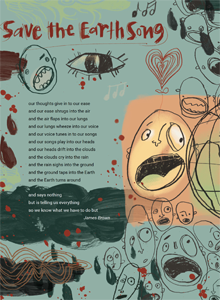
Save the Earth Song
by James Brown; illustrations by Jo Tronc
Poet James Brown explores the perils of inertia and disassociation when it comes to climate change. Implicit to the poem is a fundamental question: Why do so many people do nothing when we know the stakes are so high? This is a companion text to recent level 4 journal articles about climate change.
Series: School Journal Level 4 May 2021
Learning area: English, Social Sciences
Curriculum level: 4
Reading year level: 7
Category: Fiction
Related titles: See TSM
Topics: change, citizenship, climate change, cycle, disassociation, environment, group psychology, human behaviour, inertia, language, poetry, procrastination, responsibility, social action, taking action, verse
In: School Journal Level 4 May 2021
Publication date: May 2021
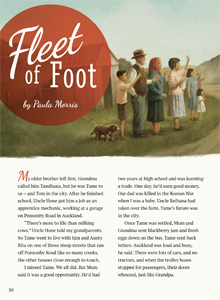
Fleet of Foot
by Paula Morris; illustrations by Andrew Burdan
The movement of Māori to the cities in the 1950s and 1960s was one of the most significant movements of people in our recent history. Paula Morris has used stories from her whānau as a basis for “Fleet of Foot”, a work of fiction that sits alongside “Kei Te Tāone Nui”, an article in the same journal that also explores the topic of Māori urbanisation. The text has links to the Aotearoa New Zealand’s histories curriculum.
Series: School Journal Level 4 May 2021
Learning area: English, Social Sciences
Curriculum level: 4
Reading year level: 7
Category: Fiction
Related titles: See TSM
Topics: 1950s, 1960s, 1970s, Aotearoa New Zealand’s histories, Auckland, change, choice, city, economics, employment, family, history, home, Māori, migration, movement, opportunity, Ponsonby, racism, social change, urbanisation, whānau, work
In: School Journal Level 4 May 2021
Publication date: May 2021
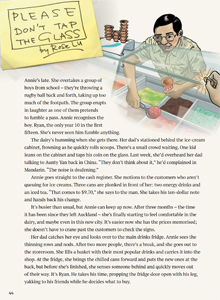
Please Don’t Tap the Glass
by Rose Lu; illustrations by Ant Sang
Author Rose Lu moved from Auckland to a much smaller place when she was twelve. Fitting in wasn’t easy, especially given that her new home contained very few Chinese New Zealanders. Suddenly Rose was different from everyone else – an experience she uses to inform her first piece of fiction for the School Journal.
Series: School Journal Level 4 May 2021
Learning area: English, Health and Physical Education
Curriculum level: 4
Category: Fiction
Related titles: See TSM
Topics: assertion, bullying, change, Chinese, confrontation, courage, difference, diversity, family, racism, resilience, self-assertion, wellbeing, work
In: School Journal Level 4 May 2021
Publication date: May 2021


 Literacy Online home
Literacy Online home
